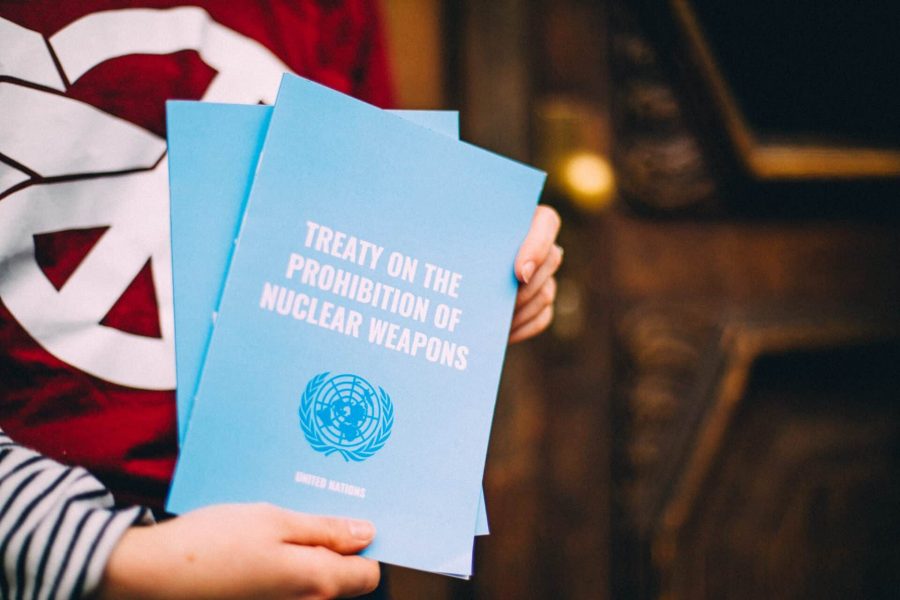
By Sofia Carolina Diaz
On January 22, 2021, the Treaty on the Prohibition of Nuclear Weapons (TPNW) entered into force. The news barely registered in Washington. Yet on that day, over 90 nations stood up to declare that the world’s most dangerous weapons have no place in a civilized society. The United States was not among them.
As nuclear tensions rise in Eastern Europe, East Asia, and beyond, the U.S. continues to modernize its nuclear arsenal at a projected cost of $1.5 trillion over 30 years. At the same time, it claims to support disarmament under the older Treaty on the Non-Proliferation of Nuclear Weapons (NPT). That contradiction hasn’t gone unnoticed. A growing number of countries, especially in the Global South, are calling the bluff. The United States must respond not with silence or skepticism but with strategic leadership. It’s time for Washington to engage with the TPNW.
The NPT, signed in 1968, was supposed to balance three objectives: preventing nuclear proliferation, promoting peaceful nuclear energy, and reducing nuclear arsenals. But while it succeeded in limiting the spread of nuclear weapons, its third pillar, disarmament, has all but collapsed. The U.S., Russia, and China are all investing heavily in new warheads and delivery systems. And as that arms race accelerates, the moral and strategic cost of deterrence increases, especially with rising risks of miscalculation or accidental launch.
The TPNW challenges this inertia. It doesn’t just prohibit nuclear weapons; it criminalizes their possession, use, and threat. Critics argue this is idealistic. But the treaty is built on the same humanitarian logic that bans chemical and biological weapons. Nuclear weapons are unique in their destructive power, and in their incompatibility with human rights. Recognizing this doesn’t weaken U.S. national security; it strengthens global stability.
Many American allies and adversaries alike see the U.S. position on nuclear disarmament as hypocritical. While Washington insists on non-proliferation for others, it refuses to make meaningful moves toward its own reductions. That damages U.S. credibility, particularly with nations in the Global South that face the consequences of global nuclear policy without having any say in shaping it.
Engaging with the TPNW, even as an observer, would signal a shift. It would show that the U.S. is willing to listen, to lead with humility, and to explore a path forward that does not rely indefinitely on weapons of mass destruction. This isn’t about unilateral disarmament. It’s about strategic realignment, toward dialogue, diplomacy, and reduced reliance on nuclear threats.
Article VI of the NPT legally binds the United States to pursue disarmament “in good faith.” But how can that be reconciled with new missile systems, warhead designs, and trillion-dollar nuclear budgets? Simply put: it can’t. The U.S. needs to start aligning its defense policies with its legal and moral obligations.
This means revisiting the Nuclear Posture Review. It means halting plans for new warheads and focusing instead on reducing the role of nuclear weapons in U.S. strategy. And it means launching a new diplomacy initiative, one that brings together allies and rivals alike to negotiate reductions that are real, verifiable, and fair. Engagement with the TPNW can be the catalyst.
Skeptics will argue that engaging with the TPNW is naïve, that it undermines U.S. commitments to NATO and the nuclear umbrella that deters aggression. But engagement does not mean withdrawal. It does not mean disarmament tomorrow. It means starting a conversation we’ve avoided for too long. The risks of doing nothing, accidental war, erosion of global norms, or diplomatic isolation, are far greater.Others fear backlash from allies who depend on U.S. nuclear protection. But true allies deserve honesty. They deserve leadership that protects not just borders, but futures. And many of them, Germany, Norway, New Zealand, are already moving toward TPNW engagement themselves.
The world has changed since the Cold War. Today’s security threats, climate change, pandemics, cyber warfare, aren’t stopped by nuclear bombs. Clinging to Cold War logic won’t keep America safe. Leadership, innovation, and cooperation will.By engaging with the TPNW, the U.S. has a chance to be what it has always claimed to be: a champion of peace, a defender of human dignity, and a country brave enough to lead by example. Let’s not wait until the next nuclear crisis starts moving in the right direction.
About the Author
Sofia Carolina Diaz is a School of Diplomacy student who participated in the UN Field Seminar course in the Spring 2025 semester.